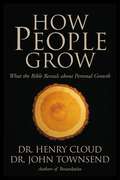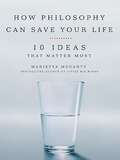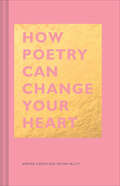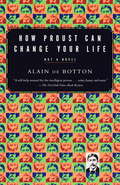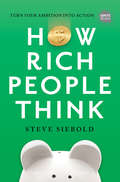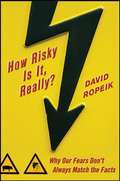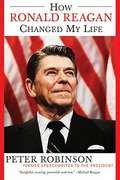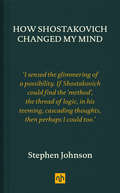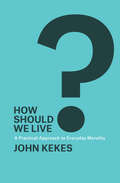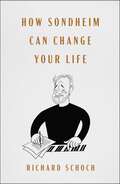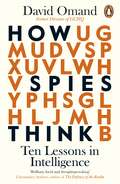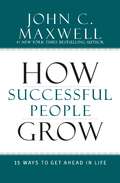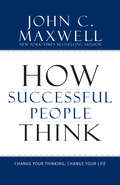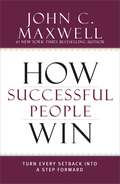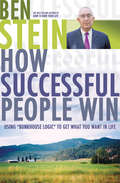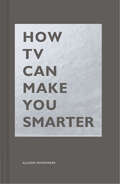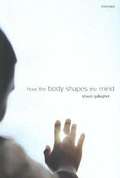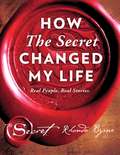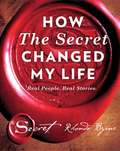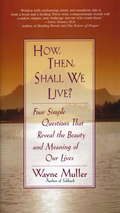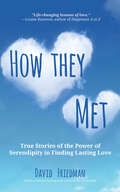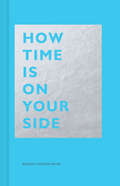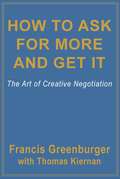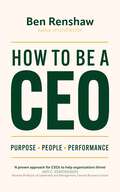- Table View
- List View
How People Grow: What the Bible Reveals About Personal Growth
by Henry Cloud John TownsendAll growth is spiritual growth. Authors Drs. Cloud and Townsend unlock age-old keys to growth from Scripture to help people resolve issues of relationships, maturity, emotional problems, and overall spiritual growth. They shatter popular misconceptions about how God operates and show that growth is not about self-actualization, but about God’s sanctification. In this theological foundation to their best-selling book Boundaries, they discuss: • What the essential processes are that make people grow • How those processes fit into a biblical understanding of spiritual growth and theology • How spiritual growth and real-life issues are one and the same • What the responsibilities are of pastors, counselors, and others who assist people in growing—and what your own responsibilities are in your personal growth
How Philosophy Can Save Your Life
by Marietta MccartyDiscover how great philosophers can help you live a more purposeful and peaceful life. This inspiring new book from the bestselling author of Little Big Minds reveals how the heartbeats of philosophy- clear thinking, quiet reflection, and good conversation- are essential ingredients in a well-lived life. Full of great discussion ideas and activities you can do with a group, How Philosophy Can Save Your Life is framed around ten "big ideas"-themes that, according to McCarty, are necessary to grasp if one wants to live a truly fulfilling life. They are: 1. Simplicity (philosophers include Epicurus and Charlotte Joko Beck) 2. Communication (philosophers include bell hooks and Karl Jaspers) 3. Perspective (philosophers include Bertrand Russell and Mary Wollstonecraft) 4. Flexibility (philosophers include Socrates, Plato and Alan Watts) 5. Empathy (philosophers include the Dalai Lama and Martin Luther King, Jr. ) 6. Individuality (philosophers include Jean-Paul Sartre and Elizabeth Spelman) 7. Belonging (philosophers include Albert Camus and Rita Manning) 8. Serenity (philosophers include Epictetus and Lao Tzu) 9. Possibility (philosophers include John Stuart Mill and Simone de Beauvoir) 10. Joy (philosophers include Shunryu Suzuki and Jane Addams) So join the greatest thinkers of all time to discover the ideas that will help you live a happier, healthier life! .
How Poetry Can Change Your Heart (The HOW Series)
by Andrea Gibson Megan FalleyA simple guide to the transformative power of reading and writing poems, from two acclaimed spoken-word artists. How can a poem transform a life? Could poetry change the world? In this accessible volume, spoken-word stars Andrea Gibson and Megan Falley roll out the welcome mat and prove that poetry is for everyone. Whether lapsed poetry lovers, aspiring poets, or total novices, readers will learn to uncover verse in unexpected places, find their way through a poem when they don't quite &“get it&”—and discover just how transformative poetry can be. Acclaim for the authors &“Propelled by all that is raw, heartfelt, and confessional . . . A tour de force.&” —Publishers Weekly on Andrea Gibson&’s Lord of the Butterflies &“The [metaphorical] daughter of Sexton and Ginsberg.&” ―Muzzle Magazine&’s &“30 Poets Under 30&” on Megan Falley
How Proust Can Change Your Life (Vintage International)
by Alain De BottonAlain de Botton combines two unlikely genres--literary biography and self-help manual--in the hilarious and unexpectedly practical How Proust Can Change Your Life.Who would have thought that Marcel Proust, one of the most important writers of our century, could provide us with such a rich source of insight into how best to live life? Proust understood that the essence and value of life was the sum of its everyday parts. As relevant today as they were at the turn of the century, Proust's life and work are transformed here into a no-nonsense guide to, among other things, enjoying your vacation, reviving a relationship, achieving original and unclichéd articulation, being a good host, recognizing love, and understanding why you should never sleep with someone on a first date. It took de Botton to find the inspirational in Proust's essays, letters and fiction and, perhaps even more surprising, to draw out a vivid and clarifying portrait of the master from between the lines of his work.Here is Proust as we have never seen or read him before: witty, intelligent, pragmatic. He might well change your life.
How Rich People Think: Condensed Edition (Ignite Reads)
by Steve SieboldIn this 1-hour read of How Rich People Think, author Steve Siebold compares the financial habits and philosophies of the middle class and the world class and outlines the beliefs and strategies that will give you the best shot at becoming a millionaire. The secret is not in the mechanics of money but in the level of thinking that generates it.This short book of inspiration is a small gift book format meant to INSPIRE! With beautiful color internals created to feel like a Ted-Talk in your hands, unlock a money-mindset that is guaranteed to accumulate wealth.Based on decades of interviews with some of the richest people in the world, this candid book will challenge every belief you've ever had about money, and if you're not careful, it may just make you rich.
How Risky Is It, Really?: Why Our Fears Don't Always Match the Facts
by David Ropeik<p>Do you worry more about radiation from nuclear power or from the sun? Are you more afraid of getting cancer than heart disease? Are you safer talking on your cell phone or using a hands-free device when you drive? Do you think global warming is a serious threat to your health? <p>GET THE FACTS BEHIND YOUR FEARS―AND DISCOVER . . . HOW RISKY IS IT, REALLY? <p>International risk expert David Ropeik takes an in-depth look at our perceptions of risk and explains the hidden factors that make us unnecessarily afraid of relatively small threats and not afraid enough of some really big ones. This read is a comprehensive, accessible, and entertaining mixture of what's been discovered about how and why we fear―too much or too little. It brings into focus the danger of The Perception Gap: when our fears don’t match the facts, and we make choices that create additional risks. <p>This book will not decide for you what is really risky and what isn't. That's up to you. HOW RISKY IS IT, REALLY? will tell you how you make those decisions. Understanding how we perceive risk is the first step toward making wiser and healthier choices for ourselves as individuals and for society as a whole.</p>
How Ronald Reagan Changed My Life
by Peter RobinsonAs a young speechwriter in the Reagan White House, Peter Robinson was responsible for the celebrated "Mr. Gorbachev, tear down this wall" speech. He was also one of a core group of writers who became informal experts on Reagan -- watching his every move, absorbing not just his political positions, but his personality, manner, and the way he carried himself. In How Ronald Reagan Changed My Life, Robinson draws on journal entries from his days at the White House, as well as interviews with those who knew the president best, to reveal ten life lessons he learned from the fortieth president -- a great yet ordinary man who touched the individuals around him as surely as he did his millions of admirers around the world.
How Shostakovich Changed My Mind
by Stephen JohnsonA powerful look at the extraordinary healing effect of music on sufferers of mental illness, including author Stephen Johnson's struggle with bipolar disorder.BBC music broadcaster Stephen Johnson explores the power of Shostakovich’s music during Stalin’s reign of terror, and writes of the extraordinary healing effect of music on sufferers of mental illness. Johnson looks at neurological, psychotherapeutic and philosophical findings, and reflects on his own experience, where he believes Shostakovich’s music helped him survive the trials and assaults of bipolar disorder.There is no escapism, no false consolation in Shostakovich’s greatest music: this is some of the darkest, saddest, at times bitterest music ever composed. So why do so many feel grateful to Shostakovich for having created it—not just Russians, but westerners like Stephen Johnson, brought up in a very different, far safer kind of society? The book includes interviews with the members of the orchestra who performed Shostakovich’s Leningrad Symphony during the siege of that city.
How Should We Live?: A Practical Approach to Everyday Morality
by John KekesA &“lucid, careful, tenacious, and always accessible&” inquiry into practical morality for everyday life by the author of The Roots of Evil (Notre Dame Philosophical Reviews). For centuries, moral philosophers have sought a single, overriding ideal that should guide everyone, always, everywhere. And after centuries of debate we&’re no closer to arriving at one. In How Should We Live?, philosopher John Kekes offers a refreshing alternative, eschewing absolute ideals and considering our lives as they really are, day by day, subject to countless vicissitudes and unforeseen obstacles. Kekes argues that ideal theories are abstractions from the realities of everyday life. The well-known arenas where absolute ideals conflict—such as abortion, euthanasia, plea bargaining, privacy, and other hotly debated topics—should not be the primary concerns of moral thinking. Instead, Kekes focuses on quotidian dilemmas such as how we should use our limited time, energy, or money; how we balance short- and long-term satisfactions; how we deal with conflicting loyalties; how we control our emotions; how we deal with people we dislike; and so on. Along the way, Kekes engages some of our most important theorists, including Donald Davidson, Thomas Nagel, Christine Korsgaard, Harry Frankfurt, Charles Taylor, Alasdair MacIntyre, and Bernard Williams, to demonstrate that no single ideal—whether autonomy, love, duty, happiness, or truthfulness—trumps any other. Instead, How Should We Live? offers a way of balancing them using a practical and pluralistic approach.
How Sondheim Can Change Your Life
by Richard SchochDiscover the powerful and universal lessons from the music and lyrics of Stephen Sondheim, the genius behind such musical theater masterworks as Company, West Side Story, and Into the Woods.Stephen Sondheim died on November 26, 2021, but for countless fans around the world, he is &“still here,&” to quote one of his lyrics. With acclaimed revivals of his landmark shows occurring around the world and introducing new generations to the man who transformed American musical theater, Sondheim&’s legacy has only grown. What is it about such classic songs as &“Rose&’s Turn&” from Gypsy, &“Send in the Clowns&” from A Little Night Music, and &“Children Will Listen&” from Into the Woods that speaks to us so intimately and profoundly? How Sondheim Can Change Your Life makes the case that Sondheim&’s greatness—beyond the clever lyrics and adventurous music—rests in his ability to tell stories that relate to us all. From Louise&’s desire for freedom as Gypsy Rose Lee to Sweeney Todd&’s thirst for revenge, we as an audience relate easily to Sondheim&’s characters. His works understand us as much as we understand them. Following the arc of Sondheim&’s career, How Sondheim Can Change Your Life is rich with stories about productions and iconic performers, deep readings of his music and lyrics, and insights into his creative process. But more than that, it reveals how Sondheim&’s works can enrich our own lives.
How Spies Think: Ten Lessons in Intelligence
by David OmandFrom the former director of GCHQ, learn the methodology used by British intelligence agencies to reach judgements, establish the right level of confidence and act decisively.Full of revealing examples from a storied career, including key briefings with Prime Ministers and strategies used in conflicts from the Cold War to the present, in How Spies Think Professor Sir David Omand arms us with the tools to sort fact from fiction.And shows us how to use real intelligence every day.*****'One of the best books ever written about intelligence analysis and its long-term lessons' Christopher Andrew, The Defence of the Realm: The Authorized History of MI5'An invaluable guide to avoiding self-deception and fake news' Melanie Phillips, The TimesWINNER OF THE NEAVE BOOK PRIZE 2022LONGLISTED FOR THE ORWELL PRIZE FOR POLITICAL WRITING 2021
How Successful People Grow: 15 Ways to Get Ahead in Life
by John C. MaxwellAre there tried and true principles that are always certain to help a person grow? John Maxwell says the answer is yes. He has been passionate about personal development for over fifty years, and here, he teaches everything he has gleaned about what it takes to reach our potential. In the way that only he can communicate, John teaches . . .The Law of the Mirror: You Must See Value in Yourself to Add Value to YourselfThe Law of Awareness: You Must Know Yourself to Grow YourselfThe Law of Modeling: It's Hard to Improve When You Have No One But Yourself to FollowThe Law of the Rubber Band: Growth Stops When You Lose the Tension Between Where You are and Where You Could BeThe Law of Contribution: Developing Yourself Enables You to Develop OthersThis compact read will help readers become lifelong learners whose potential keeps increasing and never gets "used up."
How Successful People Think: Change Your Thinking, Change Your Life
by John C. MaxwellThe perfect, compact listen for today's fast-paced world, How Successful People Think (derived from Maxwell's previous book, Thinking for a Change) will teach listeners the 11 secrets successful people know. Arranged in an easy-to-follow format, America's leadership expert, John C. Maxwell, will teach listeners how to expand their thinking and achieve their dreams. The 11 keys to successful thinking include: Big-Picture Thinking - seeing the world beyond your own needs and how that leads to great ideas Focused Thinking - removing mental clutter and distractions to realize your full potential Creative Thinking - thinking in unique ways and making breakthroughs Shared Thinking - working with others to compound results Reflective Thinking - looking at the past to gain a better understanding of the future.
How Successful People Win: Turn Every Setback into a Step Forward (Successful People)
by John C. Maxwell#1 New York Times bestselling author John C. Maxwell can teach you how to turn any situation into a winning experience. No one wins at everything they try. But any setback, whether professional or personal, can become a step forward with the right tools and mindset to turn loss into a gain. Drawing on nearly 50 years of leadership experience, Maxwell provides a roadmap for winning by examining the eleven elements that constitute the "DNA" of people who succeed in the face of problems, failure, and losses. Learning is not easy during down times. It takes discipline to do the right thing when something goes wrong. As John Maxwell often points out, experience itself isn't the best teacher; evaluating, understanding, and growing from your experience is. By examining how that process works, you can learn how to take risks and tackle challenges with a successful person's outlook. Derived from material previous published in Sometime You Win--Sometimes You Learn.
How Successful People Win: Using Bunkhouse Logic To Get What You Want In Life
by Ben SteinHow Successful People Win is a serious self-help book using as its central metaphor the life of the cowboy and his behavior as he leaves his bunkhouse. Based upon a lifetime of observation of the successful and how they got that way, Ben Stein suggests that you imitate the determination, inner mobility, activity, flexibility —and the refusal to indulge in self-pity —of the cowboy in order to get what you want out of life.The idea is that if you never indulge in making excuses, refuse to let other people’s hangups get in your way, and move deliberately toward clearly thought-out goals, you will get where you want to go. Just as the cowboy refuses to allow himself to get sidetracked by trivia, so can you refuse to allow life’s inevitable challenges and distractions mar your own success and happiness. The choice is yours.
How TV Can Make You Smarter (The HOW Series)
by Allison ShoemakerHow TV Can Make You Smarter is a lively guide that shows readers the numerous emotional and intellectual benefits of TV. Contrary to conventional wisdom, television can do more than help you veg out, chill, and escape. Author and TV critic Allison Shoemaker rewires our thinking to show readers how to take advantage of our 24/7 access to this ever-evolving medium.• TV is a powerful tool and How TV Can Make You Smarter will teach you how to use it.• Covers a wide selection of diverse genres from scripted comedies, dramas, and classics to reality and beyond• Find acceptance in embracing "bad" TV, and learn to love yourself in the morning.Lessons include learning how to gain empathy (Mad Men), broadening your perspective (Rupaul's Drag Race), and discovering how working within boundaries (Doctor Who) or breaking them apart (Buffy the Vampire Slayer) can be good for you.Part of the HOW series, the accessible and authoritative guides to engaging with the arts the world, and ourselves.• Filled with smart, unintimidating content in a giftable foil-stamped package• Great for TV and movie buffs, Netflix and Hulu subscribers, DVD owners, and anyone who loves to unwind with television• Packed with insightful tips and tricks for making the most out of what you watch• You'll love this book if you love books like Amusing Ourselves to Death: Public Discourse in the Age of Show Business by Neil Postman, Everything Bad Is Good for You: How Today's Popular Culture Is Actually Making Us Smarter by Steven Johnson, and I Like to Watch: Arguing My Way Through the TV Revolution by Emily Nussbaum.
How The Body Shapes The Mind
by Shaun GallagherHow the Body Shapes the Mind is an interdisciplinary work that addresses philosophical questions by appealing to evidence found in experimental psychology, neuroscience, studies of pathologies, and developmental psychology. There is a growing consensus across these disciplines that the contribution of embodiment to cognition is inescapable. Because this insight has been developed across a variety of disciplines, however, there is still a need to develop a common vocabulary that is capable of integrating discussions of brain mechanisms in neuroscience, behavioral expressions in psychology, design concerns in artificial intelligence and robotics, and debates about embodied experience in the phenomenology and philosophy of mind. Shaun Gallagher's book aims to contribute to the formulation of that common vocabulary and to develop a conceptual framework that will avoid both the overly reductionistic approaches that explain everything in terms of bottom-up neuronal mechanisms, and inflationistic approaches that explain everything in terms of Cartesian, top-down cognitive states. <p><p> Gallagher pursues two basic sets of questions. The first set consists of questions about the phenomenal aspects of the structure of experience, and specifically the relatively regular and constant features that we find in the content of our experience. If throughout conscious experience there is a constant reference to one's own body, even if this is a recessive or marginal awareness, then that reference constitutes a structural feature of the phenomenal field of consciousness, part of a framework that is likely to determine or influence all other aspects of experience. The second set of questions concerns aspects of the structure of experience that are more hidden, those that may be more difficult to get at because they happen before we know it. They do not normally enter into the content of experience in an explicit way, and are often inaccessible to reflective consciousness. To what extent, and in what ways, are consciousness and cognitive processes, which include experiences related to perception, memory, imagination, belief, judgment, and so forth, shaped or structured by the fact that they are embodied in this way?
How The Secret Changed My Life
by Rhonda ByrneSince the very first publication of The Secret a decade ago, Rhonda Byrne's bestselling book has brought forth an explosion of real people sharing real stories of how their real lives have miraculously changed for the better. How The Secret Changed My Life presents a selection of the most heartwarming and moving stories in one inspirational volume. Each story provides an authentic, real-life illustration of the pathway that leads to success in every area of life: money, health, relationships, love, family, and career. The people inHow The Secret Changed My Life show time and again that no one is excluded from living the life of their dreams.
How The Secret Changed My Life: Real People. Real Stories
by Rhonda ByrneSince the very first publication of The Secret a decade ago, Rhonda Byrne's bestselling book has brought forth an explosion of real people sharing real stories of how their lives have miraculously changed for the better. How The Secret Changed My Life presents a selection of the most heartwarming and moving stories in one inspirational volume. Each story provides an authentic, real-life illustration of the pathway that leads to success in every area of life: money, health, relationships, love, family and career. The people in How The Secret Changed My Life show time and again that no one is excluded from living the life of their dreams.
How The Secret Changed My Life: Real People. Real Stories. (The Secret Library #5)
by Rhonda ByrneAn awe-inspiring compilation of the most uplifting and powerful real-life stories from readers of the worldwide bestseller The Secret. Discover how everyday people completely transformed their lives by applying the teachings of The Secret.Since the very first publication of The Secret a decade ago, Rhonda Byrne's bestselling book has brought forth an explosion of real people sharing real stories of how their real lives have miraculously changed for the better. How The Secret Changed My Life presents a selection of the most heartwarming and moving stories in one inspirational volume. Each story provides an authentic, real-life illustration of the pathway that leads to success in every area of life: money, health, relationships, love, family, and career. The people in How The Secret Changed My Life show time and again that no one is excluded from living the life of their dreams.
How Then, Shall We Live?
by Wayne MullerWe all long to experience a sense of inner wholeness and guidance, but today's notions of healing and recovery too often keep us focused on our brokenness, on our deficiencies rather than our strengths. Wayne Muller's luminous new book gently guides us to the place where we are already perfect, already blessed with the wisdom we need to live a life of meaning, purpose and grace.He starts, as do so many spiritual teachers, with simple questions: Who am I? What do I love? How shall I live, knowing I will die? What is my gift to the family of the earth? He then takes us deeper, exploring each question through transformative true stories. We meet men and women--Wayne's neighbors, friends, patients--who have discovered love, courage, and kindness even in the midst of sorrow and loss. And through them we glimpse that relentless spark of spiritual magic that burns within each of us.Woven throughout are contemplations, daily practices, poems, and teachings from the great wisdom teachings. Page by page, we become more awake to the joy and mystery of this precious human life, and to the unique gifts every one of us has to offer the world.
How They Met: True Stories of the Power of Serendipity in Finding Lasting Love
by David FriedmanFind Hope With This Collection of True Stories of Lasting RomanceThe surprising beginnings of true love: You never know when it might happen: love might be right around the corner, down the block, or across the aisle from you on your next flight. Stories of how people met are endlessly fascinating and they remind us that we all need to be ready for anything, including meeting the love of your life when you least expect it.Healing stories of serendipitous romance: After a bad break up, composer and beloved songwriter David Friedman embarked on a decade-long journey collecting couple’s stories of “how they met” as a therapeutic project. What Friedman learned was utterly surprising?there was always an element of serendipity, planning had nothing to do with it. Along the way, what started out as a path to moving forward became a mission to better understand matters of the heart.Romantic biographies and real-life relationships: In this study of true romance, Friedman talks to people from every walk of life, from devout churchgoers to same sex couples to celebrities. Among others, How They Metshares the moving stories of how Lucie Arnaz met her famous mate, Lawrence Luckinbill, and the unexpected story of Kathie Lee and Frank Gifford’s friendship turning to romance.How They Met gives readers:Real life stories that will give hope to even the most heart broken.A truly diverse set of stories that shows the universality of true love.A close-up look at the romances and relationships of famous couples.This collection of true stories will have you believing that love will find YOU – perhaps when you least expect it!
How Time Is on Your Side (How Ser.)
by Bridget Watson PayneYes, there really is enough time to do it all: the passion projects, the to-do list, or simply making time to do nothing—the trick is knowing how to look for it. Packed with helpful tips, How Time Is on Your Side is a simple handbook to help reframe your relationship with time. Through practical productivity tools and inspiring stories of people who make time for the things that matter to them, you will find that achieving your goals isn't as farfetched as it seems. Let the encouraging words of artist and author Bridget Watson Payne be your guide to reinvent your relationship with time: it's not the enemy; it's a friend.• Learn how to nurture your inner creative, spiritual, emotional, and mental lives.• Written in author Bridget Watson Payne's smart, friendly, tell-it-like-it-is prose• Tips and tricks include utilizing your calendar to its full advantage, doing mental work in the morning and physical work in the afternoon, and putting your big goals on your to-do list.With smart, unintimidating content, this guide is sure to inspire anyone to make time to achieve their goals. Take a moment, a minute, or a day to reinvent your relationship with time, and discover how it can work for you.The time you need is there. Let How Time Is on Your Side help you find it.• A great book for men and women of any age, creatives and aspirational creatives, busy professionals, students, young families, graduates, and self-improvement seekers• Great for busy people who want to make the most of their time• Perfect for fans of The Creative Habit by Twyla Tharp, Manage Your Day-to-Day by Jocelyn Glei, and Make Time: How to Focus on What Matters Every Day by Jake Knapp and John Zerat
How To Ask For More and Get It
by Thomas Kiernan Francis Greenburger"How To Ask For More And Get It is not, as the title might suggest, a book for the greedy, pursuing compulsive and unrealistic dreams of acquiring more worldly wealth. Rather, it is designed to help the average person get his due in the thousands of exchanges, both mundane and important, that punctuate his or her life," says Francis Greenburger and Thomas Kiernan.All of us are confronted daily with countless exchanges, both ordinary and extraordinary, the outcomes of which largely define the quality of our lives. In fact, the Exchange is the single most frequent and important process of our interpersonal existence. Negotiation is the art of consistently turning these exchanges to one's advantage, and this book shows how to master this art.Using examples from real-life situations, the authors show you how to develop your basic negotiating skills--how to state your criteria, who makes the first move, what tactics to use, how to set your goals and establish a strategy--in short, how to win!Whether you are an employee bargaining for a raise, the tenant applying for a lease, the homeowner planning an expansion, the spouse settling a quarrel, a man with an attractive young lady in mind...whether you are the layman or the professional, this book will teach you how to make the most of the exchanges which touch every facet of your life."Imagine yourself in any of the following situations:You are about to walk into a realtor's office to make an offer on your dream house or to rent the apartment you've finally found after months of searching...You are about to sit down with your spouse's lawyer to discuss the financial terms of your impending divorce...Tomorrow you are to appear for you final interview with a company you feel sure will offer you the job you have been seeking, at which your salary and other benefits will be decided...You are about to sit down with an auditor from the IRS...The "bottom line" of such exchanges is that we either gain or lose by them, financially and otherwise. Motivated by our innate self-interest, we naturally hope to acquire more than we give away. More often than not, however, we end up losing more than we gain. Why? Because we do not know how to negotiate our needs, our rights, our hopes, and our wishes..."Francis Greenburger operates an extremely successful New York real estate business--a milieu in which the negotiator's art is severely tested and sharply honed. Recently, he expanded his interest to include the publishing world and now operates an equally successful literary agency--another pursuit in which negotiating is the key to success. This is his first book.Thomas Kiernan was an editor for many years. He is also the author of fourteen previous books.
How To Be A CEO: Purpose. People. Performance.
by Ben RenshawThe haloed CEO role is a rarified position which takes a special combination of the right mindset, skillset and tools to succeed. Many people aspire to the elevated heights of a CEO and crave the experience and versatility of the best in business - yet few have a clear pathway to develop their skills and put themselves in the picture for a big leadership role. Now, in How to be a CEO, the experienced executive coach Ben Renshaw has conducted extensive research with CEOs from small, mid-size and large companies, Executive Committee members who work for CEOs and renowned Professors of Leadership, to distill the vital essence of what it takes to become a great CEO.In recent years the world of work has experienced unprecedented change causing organizations, leaders, teams and individuals to rethink about what work means and what they want. It has given everyone the license to ask questions about how to work in better ways and to expect straight answers from relevant stakeholders. Never has it been more important to equip aspiring leaders with the skills to succeed, as well as helping existing CEOs build robust succession plans to ensure the sustainability of their organizations.How to be a CEO outlines a compelling journey to leadership greatness. Based on a simple 3P Model: Purpose, People & Performance it provides a practical guide to accelerate leadership development for those who want to be at the front of evolution in the uncertain world of work. The book will help unlock your thinking about what you stand for as a leader and the impact that you want to have. It will challenge you to leverage your strengths and address your development opportunities. It will invite the reader to create their own framework for becoming the best CEO candidate they can, to equip them for the role if they are in contention, and to challenge leaders at all levels to raise their game and lead greatly. All the leadership answers in one slim volume.
